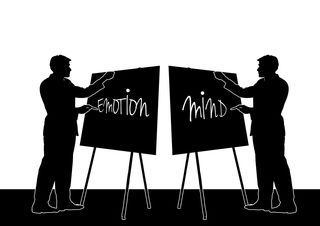Adolescence
Why Isn't My Teen Listening to Me?
Knowing their state of mind.
Posted November 18, 2019

Like many parents, I have been known to complain that my teens are disregarding my “sound, logical advice” or that their emotions are ruling their decisions. These complaints have been echoed back to me by so many parents of teens in my clinical practice. A principal reason for this phenomenon is a difference in “state of mind.”
Dialectical Behavior Therapy identifies three states of mind from which we operate. Two of these are at opposite ends of the spectrum: emotion mind and reasonable mind. The third state of mind, wise mind, is considered the synthesis or integration of these two extremes. An understanding of all three can shed some light on why our adolescents' decision process is often in contrast to ours.
Emotion Mind: Emotion mind describes a state wherein our emotions are in full control of our thoughts and actions. In this state of mind, our decisions are driven by an intense mood state and the urges that stem from that mood. Reason and logic do not feel important and often seem inaccessible.
Emotion mind has its benefits. It is the emotion mind that often leads to remarkable acts of courage and love. Acts that would not occur if logic were in the mix. However, the intense urges of emotion mind that cause us to save a life by running into a burning building can also lead us to very ineffective behaviors. These behaviors often bring short-term relief, followed by negative outcomes in the long term. For example, we may act on angry urges to lash out without access to the reasoning that would indicate the long-term harm to relationships.
To clarify, a person who is highly emotional is not always in a state of emotion mind. The distinguishing feature is whether that intense emotion has overridden logical thought.
Reasonable Mind: In contrast to the emotion mind, the reasonable mind is a state wherein facts and logic are not balanced by the input of emotions and values. This state of mind allows us to make practical plans. It is highly beneficial when we are following instructions, solving problems, and trying to make logical evaluations of a situation.
However, the absence of emotional input can lead to decisions that seem cold or too methodical. Consider making the decision to marry from a reasonable mind. You might pick a partner that checks all the boxes on your list of desirable attributes. Yet, the decision would likely be a poor one if it neglects to take into account love and emotional needs.
Oftentimes when we are asking someone to “be reasonable,” we are asking them not to distort, exaggerate, or misperceive facts based on their emotional experience. That is a tall order for someone who is not naturally in a reasonable mind state. It is almost impossible for someone in an emotional mind state.
Wise Mind: According to Dialectical Behavior Therapy, the optimal state of mind is a wise mind, the interactions of our emotions and our logic. In this state of mind, we are able to access and apply both our logic and our values, our facts and our emotions, our analytic ability, and our intuition. Everybody has a wise mind state, but no one is in wise mind all the time.
We cannot force ourselves or others into wise mind. However, recognizing our own state of mind and that of others we are interacting with can lead to a greater understanding of each other’s perspective.
It is the knowledge and awareness of these states of mind that can help us communicate more effectively with our adolescents. Often, part of the difficulty is that we are approaching conflict when we are experiencing different states of mind, or when both parties are in emotion mind.
As we have all observed, adolescence is a time of intense and rapidly shifting emotion. Furthermore, according to the Academy of Adolescent and Child Psychiatry, adolescent actions are guided more by the emotional and reactive amygdala and less by the thoughtful, logical frontal cortex. This does not suggest that adolescents are always in emotion mind or that they are not capable of wise mind. Yet, it does imply that there is an increased likelihood that an intense emotional state will result in emotion mind decisions and behaviors.
When this occurs, I often hear stories that parents are reacting to their adolescent’s emotion mind from a reasonable mind. Alternatively, the intense emotions their adolescent is experiencing and directing at them results in a parent’s own experience of emotion mind. Consider the interactions that likely result.
At first glance, one might think that approaching a teen in emotion mind with one’s own reasonable mind would “balance the equation.” In fact, quite the opposite occurs. When we are approaching a situation or conversation from opposite states of mind, the likelihood is that neither party feels understood or validated.
Remember that emotion mind involves a lack of logic, and reasonable mind is devoid of emotion. The lack of feeling heard leads each person to dig further into their own perspective. An escalation in tempers is very likely!
An even more intense escalation of tempers will result if we react to our emotion-minded teen from our own emotion mind. It is much easier to fall prey to emotion mind when strong emotions are directed at us. At the same time, engaging at this time means we have two people interacting who cannot access logic and reason. This is not pretty!
For parents and adolescents to engage in productive conversations and decision making, it is optimal for both parties to be in wise mind. We can increase the likelihood of these interactions with a few steps.
1. We can learn to recognize our own state of mind and that of our children. Most people are naturally prone to one but can experience all three.
2. When you know your child is in emotion mind, work to validate their emotions (see my post entitled “How To React To Adolescent Emotions”). Continue only to validate until the intensity of their emotion decreases. You can also pause the conversation to allow your teen to self-soothe.
3. When you recognize your own emotions are escalating, pause the conversation. Take some time to validate your own emotions and engage in a more soothing activity.
There is no perfect recipe for positive interactions with our teens and tweens. Yet, I am confident that awareness of the state of mind is a key ingredient.
References
Linehan, M.M. 2015.DBT Skills Traing Manual, Second Edition. New York: Guilford Press




